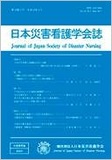Japanese
English
- 有料閲覧
- Abstract 文献概要
- 参考文献 Reference
【要約】
目的:東日本大震災の被災地域に居住し、支援業務に従事する自治体職員(以下、支援者)の疲労状況の実態を客観的な評価に基づいて把握し、疾病予防のための看護支援の示唆を得る。
方法:被災地の支援者を対象とした。自律神経機能、身体活動量(睡眠時間と覚醒時平均活動量)、酸化ストレス値を評価し、疲労状況を把握した。t検定および一元配置分散分析を行い、測定項目別の関連を分析した。
結果:同意が得られた対象者は384名、平均年齢は40.3歳であった。自律神経機能評価で疲労感が強かった者は228名(62%)、LF/HF比のバランスが崩れていた者は88名(24%)であった。40歳以上群より40歳未満群のLF/HF比は有意に上昇し(p=0.019)、睡眠時間は延長していた(p=0.037)。女性より男性の居眠り回数が有意に多く(p=0.014)、覚醒時活動量が少なかった(P<0.001)。LF/HF比のバランスが崩れるほど、睡眠状態は悪化していた(p=0.001)。
結論:支援者は自覚する疲労感とLH/HF比に相違があり、特に40歳以上の支援者の疲労状態が強いことが認められた。被災者への支援だけでなく、支援者の疲労状態にも目を向け、支援者へ予防的に休息取得を促す看護介入の必要性が示唆された。
Purpose: This study was conducted to clarify fatigue levels among people working in areas stricken by the Great East Japan Earthquake for consideration of nursing care toward the prevention of disasterrelated conditions.
Method: A survey of public servants working in quake-stricken areas was conducted to evaluate fatigue levels based on analysis of autonomic nerve function, sleep-wake rhythms, oxidative stress and the results of a questionnaire on perceived fatigue. The data were analyzed via t-testing and one-way analysis of variance. The study was conducted with the approval of the Research Ethics Committee.
Results: A total of 384 people (mean ± SD age: 40.3 ±10.1 years) agreed to take part in the study. In autonomic nerve function evaluation, 228 (62%) reported high levels of fatigue, and 88 (24%) reported a loss of balance in their LF (low-frequency) /HF (high-frequency) heart rate variability ratio, which showed a significant correlation to sleep efficiency (p = 0.014). With regard to age (under and over 40 years old), the LF/HF ratio and sleep time were significantly higher among the younger group (younger: p = 0.019; older 0.037). With regard to gender differences, time spent napping was significantly higher (p = 0.014) and diurnal activity was significantly lower (p < 0.001) among men.
Conclusion: All public servants working in stricken areas showed differences in awareness of fatigue levels and LF/HF ratios. Fatigue levels were particularly high among the group aged over 40 years old. The results indicate that preventive nursing care for fatigue is important among young staff working in stricken areas.
Copyright © 2017, Japan Society of Disaster Nursing All rights reserved.


